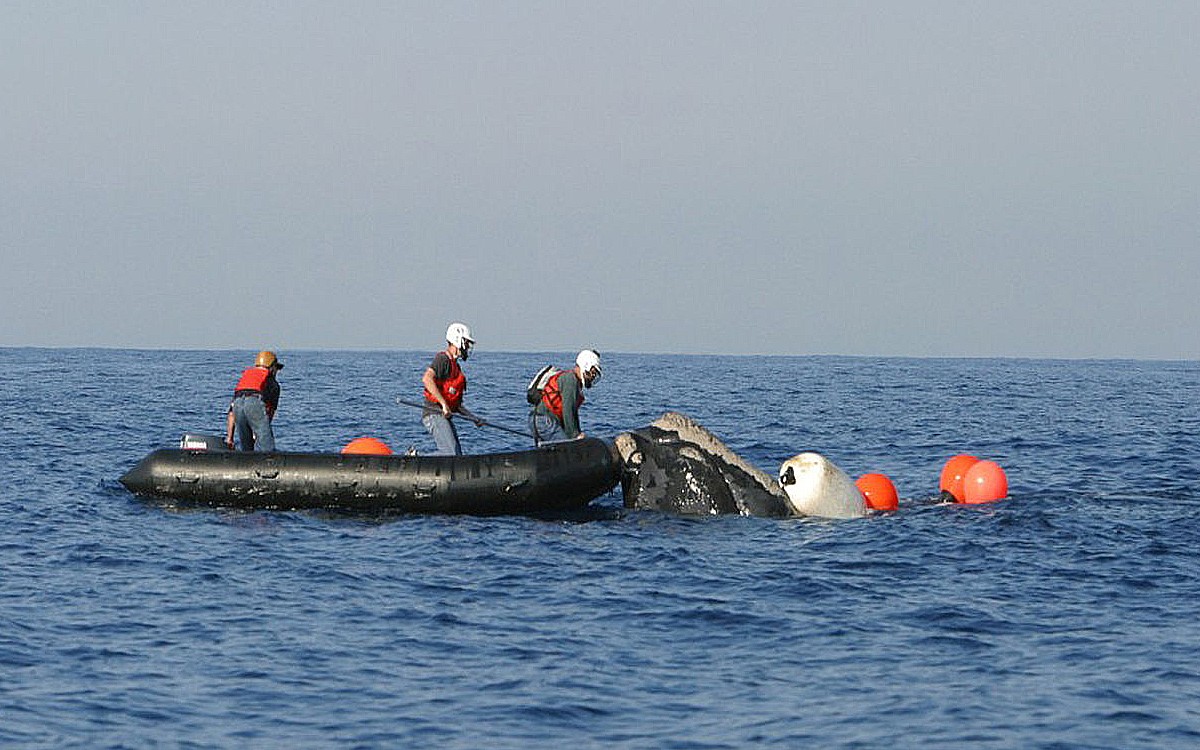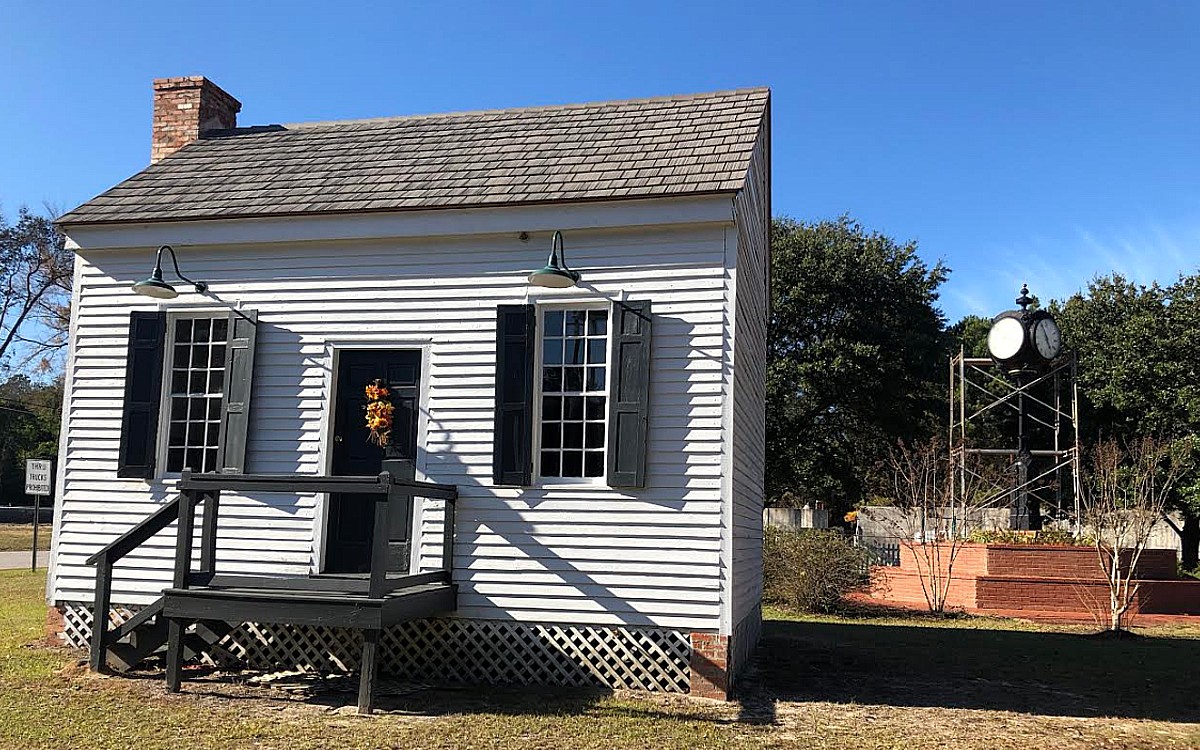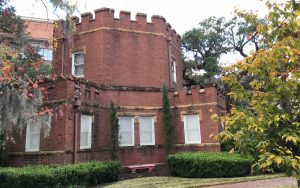INSIDE ISSUE 18.49 | Dec. 6, 2019
 BIG STORY: State’s largest debt sparks battle over public benefit
BIG STORY: State’s largest debt sparks battle over public benefit
NEWS BRIEFS: State’s luck running out on whales, pre-filing coming, more
COMMENTARY, Brack: OK, boomlets: Back off on boomers
SPOTLIGHT: Municipal Association of South Carolina
MY TURN, Treece: Do more South Carolina: Protect our whales
FEEDBACK: Free press is crucial to functioning democracy
MYSTERY PHOTO: What could this be?
S.C. ENCYCLOPEDIA: Country ideology
State’s largest debt sparks battle over public benefit

By Lindsay Street, Statehouse correspondent | An ideological divide is growing in South Carolina over whether the state should continue to provide its employees with a public pension — even though the legislature overhauled it just two years ago.
Labeled as “phase two” of possible pension reform, advocates are seeking to change the guaranteed, public-backed benefit to something more akin to a 401(k), that puts the liability on the back of individual state employees.
One in 10 people in South Carolina relies on a state-funded retirement plan that, despite 2017 legislative state fixes, continues to face huge problems. At the top of the list: the $25 billion long-term liability of the pension plan. Some say it is an unfunded mandate — a financial noose tightening around the state’s coffers. Why? Because it uses variable revenue sources, including market-based investments.

“It’s the biggest issue we’re facing and it will always be the biggest issue we face in our lifetimes,” state auditor Comptroller General Richard Eckstrom said.
In the last year, the state incurred $1.5 billion in losses from underperforming investments from the pension program that manages $32 billion in contributions, Eckstrom said. Some critics complain the state’s assumption of a 7.25 percent return on its investments is unrealistic.
South Carolina is part of a national trend of states failing to fund their pension plans adequately, according to multiple nationwide studies. In 2017, the state pension funds in a Pew Charitable Trust study cumulatively reported a $1.28 trillion funding gap.
Most officials around Columbia say legislation from 2017 largely fixed the problem — even some of the system’s biggest critics like Republican state Treasurer Curtis Loftis. But Eckstrom, who also is Republican, and a few GOP lawmakers disagree, saying the state needs to implement a hase two to avoid financial ruin and broken promises.
What ‘2017’ did for pensions
In 2017, legislators did three things: lowered fees for investment, increased the amount of money to fund the pension through an enhanced employer contribution (mostly the state, but the pension includes local governments, schools and other public agencies), and gave the state investment commission instructions for “better” investing, according to S.C. Sen. Vincent Sheheen, D-Kershaw.

In a Sept. 24 Senate Finance Retirement Systems subcommittee meeting, S.C. Retirement Investment Commission head Mike Hitchcock told lawmakers, including Sheheen: “You cannot underestimate the positive impact of (the 2017 pension) legislation.” He reiterated that same comment in written answers to questions submitted by Statehouse Report this week.
- Much of the overhaul was based on recommendations by the Funston Advisory Services Report. Read a 2018 report on how the state implemented those recommendations.
Public employers will put in 18 percent of their payroll into the pension system by 2022-2023 after increasing every year by one percent. Employees already contribute 9 percent, and no additional contributions are asked of them by the legislation.
“This problem took a long time to development and it takes time to be solved, and what we did in 2017 has already shown dramatic improvements,” Sheheen said. “2017 was a much much bigger deal than people understand. We basically made the pension fund stable and made it … where the outstanding unfunded liabilities should be paid off.”
That could happen as soon as 22 years under current projections, Sheheen said.
“The 2017 Pension Reform Bill instituted changes that have stabilized the pension system and placed it on a path to fiscal health. Even though we are ahead of schedule, the unfunded liability is a problem that will take many more years to fully address and will require patience,” Hitchcock wrote Statehouse Report.
Eckstrom disagreed that pensions are fixed in the state.
“This retirement system continues to hemorrhage,” he said, adding the state paid $1.2 billion last year, but didn’t earn the projected 7.25 percent needed to fully fund retirees, which caused it to incur a $1.5 billion loss — meaning millions of promised dollars were not earned.
‘Phase two’ being pushed now
Hitchcock said the state needs to remain vigilant but that the retirement system does not need any further intervention.
“We do not need to do anything more legislatively to make the system solvent,” Hitchcock wrote. “Just a few years in, the reforms are already yielding substantial progress. However, there is no doubt that the additional contributions the bill requires place a substantial burden on our state agencies and local governments … (but) we need to hold fast to the funding policy.”

A longtime critic of the state’s pension system, Loftis, said he’s satisfied with the 2017 changes.
“The reforms of 2017 were good reforms. There’s still a little bit of refinement needed but I have high hopes that the management in place now is going to do well,” Loftis told Statehouse Report.
Eckstrom remains skeptical about the financial future.
“We’ve pretty well demonstrated we can’t run this kind of plan. I can’t imagine what more proof anyone needs to look at the miserable results we have to show for how incompetent we have been,” he said.
Still trying to change the model
Some Republican lawmakers in the S.C. House and Senate are proposing altering the state’s retirement system to put investing responsibility on the individual. Eckstrom agreed with those models.
The current public pension system is a defined benefit plan, which is financial-planning speak for the employer taking investing responsibility and promising an end-result.
One of the alternatives floated is a public retirement plan based on defined contributions would operate more like a 401(k). The employer doesn’t buffer the investing risk, you select where your money is invested, and if the market flounders, so does your retirement savings.

Summerville Republican Sen. Sean Bennett introduced Senate Bill 167 in January, but the bill has stalled in the Finance Committee.
“The biggest reasons why we have to look at a ‘phase two’ is that the current system is just not sustainable,” Bennett said. The bill would “by default” put new employees under the 401(k)-type plan, but have an option to opt-into a public pension system that would be more stringent than the current system.
Bennett said the bill not only fixes the solvency issue long term, but it would also allow for “wealth-building” among rural, lower-income public workers. A pension plan cannot be inherited, but money from a defined contribution plan can, he said. It would also be able to transfer to an IRA or other investment plan should a worker return to the private workforce.
Bluffton Republican Rep. Bill Herbkersman said he’s looking at introducing similar legislation in 2020, but it would “hybridize” the two plans, meaning for part of your service would be under a defined contribution plan, and part of your service would be under a defined benefit plan.
“2017 was to stop the bleeding and now we are actually going to dig out of the hole,” he said.
Both lawmakers said they have been working with libertarian think tank Reason Foundation and moderate nonprofit Pew Charitable Trusts on the issue.

Sheheen said he is not opposed to further changes, but cautioned against “rash decisions.”
“I have sensed less urgency (around the Statehouse) because the current pension is coming into balance but I think there is still a debate. I’m open to considering changes for new hires but one of my touchstones is, I’m not going to leave a career policeman with a retirement that won’t support him,” he said. “I need somebody to show me they will have enough money to retire. That’s just the moral obligation of the state.”
- Have a comment? Send to: feedback@statehousereport.com
State’s luck running out on whales, pre-filing coming, more

By Lindsay Street, Statehouse correspondent | A migrating whale that cruises through South Carolina waters is being killed at 10 times the rate its population can sustain, largely due to vessel-strikes and commercial fishery entanglements, experts say.
And while South Carolina has avoided deaths, a wildlife advocate says that is down to luck, not policy.
The Nov. 27 edition of Charleston City Paper showcased a story about the threat endangered right whales face along the Eastern seaboard. A few days later, the Hilton Head Island Packet reported a sighting of the rare creature by a fisherman.
Endangered right whales are migrating along the South Carolina coast now as they move from rich feeding grounds in northern waters to warmer breeding grounds near Florida.
Caroline Bradner, land water and wildlife project manager with Coastal Conservation League of Charleston, said South Carolina needs to remain vigilant in an effort to protect the whales that were once prized for their blubber to fuel lamps prior to electricity and the incandescent light bulb.
The right whale population is in such dire straits that it can only sustain three to five deaths per year, not the 30 that happened since 2017, the City Paper reported.
NOAA’s list of right whale mortalities do not include any that happened in South Carolina, but that could change as the seas rise and warm — and it doesn’t mean that other marine wildlife like manatees aren’t threatened in waters here, Bradner said.
In South Carolina waters, the only direct protection for whales are found in federal regulations lowering ship speeds as they come into harbors.. The state’s lack of seismic testing and offshore drilling is also a boon, Bradner said. But those two things could change.
- Read: S.C. Republicans are among the GOP strongholds pushing back against offshore drilling.
“We in South Carolina can’t do a whole lot about what’s happening in Canada and the Northeast where they are feeding,” Bradner said. “(But) we can be proactive in making sure that if whales are spending more time in South Carolina waters … then we would need to ensure they are finding a hospitable environment when they are here.”
In other S.C. news:
![]() More bills to be pre-filed Dec. 11. House members and state senators will pre-file bills Dec. 11 for the ending year of the 2019-2020 session. House members already pre-filed 97 bills last month. Dec. 11 will be the Senate’s only opportunity to pre-file legislation before the session begins Jan. 14. See pre-file legislation for the Senate here, and the House here.
More bills to be pre-filed Dec. 11. House members and state senators will pre-file bills Dec. 11 for the ending year of the 2019-2020 session. House members already pre-filed 97 bills last month. Dec. 11 will be the Senate’s only opportunity to pre-file legislation before the session begins Jan. 14. See pre-file legislation for the Senate here, and the House here.
Lydon confirmed for federal bench. U.S. Attorney Sherri Lydon of South Carolina was confirmed this week by the U.S. Senate as the state’s newest federal judge. First Assistant U.S. Attorney Lance Crick will serve as interim until a new top prosecutor can be appointed by the Trump administration and approved by the Senate. House Judiciary Chair Peter McCoy is reportedly a favorite to succeed Lydon.
Massive magistrate coverage shows flaws. The Post and Courier has released a series of articles over the past week on magistrates, which are appointed by the state legislature — exposing concerns that these judges have little training and have the power to affect thousands of lives. Read more here.
SCforEd sets deadline for legislative agenda. The grassroots teacher group SCforEd has released a legislative agenda and says state lawmakers have until March 17 to agree to their requests or they will “respond accordingly.” The group’s legislative agenda includes a 5 percent salary increase, reducing standardized testing, approval of a teacher’s freedom of speech bill, limits to class sizes and more. Read more.
S.C. child-welfare agency requests $127 M. S.C. Department of Social Services has asked lawmakers for $127 million in a budget that would cover employee raises and hiring more caseworkers. Read more.
 2020 candidate calendar
2020 candidate calendar
Throughout the campaign season, we are working to keep South Carolina informed of candidate events in the state. Have an event you want us to know about? Email us at 2020news@statehousereport.com.
- Warren to speak Dec. 8 at College of Charleston event. Massachusetts Democratic Sen. Elizabeth Warren will attend the College of Charleston’s Bully Pulpit series 3:15 p.m. Dec. 8 at F. Mitchell Johnson Physical Education Center, College of Charleston. RSVP here.
- Have a comment? Send to: feedback@statehousereport.com
OK, boomlets: Back off on boomers

By Andy Brack, editor and publisher | OK, boomlets. Stand down. The older folks aren’t all that bad.
Millennials and iGen kids who now gleefully deprecate and mock baby boomers these days need to face the reality that the very lifestyle that keeps them connected, in tune, entertained, online and hip to what’s happening is due to … wait for it … baby boomers.
 Boomers grew up with corded phones, black-and-white televisions, three major networks, spark plugs and transistor radios. And they walked 20 miles in the snow to school. They had no cell phones. No Spotify, Pandora, YouTube, Facebook, Twitter, Instagram, Amazon, FedEx, Sirius XM, streaming media.
Boomers grew up with corded phones, black-and-white televisions, three major networks, spark plugs and transistor radios. And they walked 20 miles in the snow to school. They had no cell phones. No Spotify, Pandora, YouTube, Facebook, Twitter, Instagram, Amazon, FedEx, Sirius XM, streaming media.
The babies born in the generational boom after World War II dreamed of a better world. They dropped out, only to drop in with grassroots activism for women’s liberation, civil rights, gay rights. But they also created the stuff that drives today’s society and makes day-to-day life much easier than they had growing up.
Baby boomers invented the Internet (thanks, Tim Berners-Lee) that boomlets can’t be away from for more than a few hours. Heard of folks like Steve Jobs and Steve Wozniak (Apple), Bill Gates (Microsoft) and Ajay Bhat (USB port)? Or how about Bill Clinton, George W. Bush, Barack Obama and Donald Trump? Or Eddie Murphy, Jerry Seinfeld, Scott Adams, Garry Trudeau, Oprah and Madonna. All boomers.
Then there are baby boomers who revolutionized their fields in ways that continue to rock our world today — Robert Jarvick (artificial heart), Dean Kamen (Segway, portable dialysis machine and implantable insulin pump), Gerd Binning (scanning tunneling microscope), Gill Samuels (Viagra) and Ray Kurzweil (optical character recognition and text-to-speech technology).
“Ask the average person to name who dreamed up the web, DNA fingerprinting or the lithium-ion battery, and most likely you’ll draw a blank stare,” Reuters reported a few years ago. “That anonymity is deceptive. Boomers’ inventions — ranging from the now-ubiquitous World Wide Web to the synthetic cell and the nanoscale motor — promise to reshape the world of the 21st century as surely as Edison’s [light bulb] and Tesla’s [AC power] set the stage for the 20th.”
The world we live in, for better and worse, is a reflection of how boomers created the world inhabited by today’s boomlets — millennials (1977 to 1995) and IGen (1996 to 2010), also known as Gen Z.
So for those who mock baby boomers with the viral and dismissive retort, “O.K., boomer,” maybe you need to lay off a little. Boomers made it easier, in many ways, for you to grow and engage a society where immediate entertainment and information gratification is commonplace.
But before boomers get all smug, fatter and happier, they need to realize they also contribute to the frustrations that cause boomlets to lash out. Baby boomers wanted to change the world — and they did, but it hasn’t always turn out so great.
Boomers, rebelling as hippies in the 1960s, got caught up in the “me” generation, which led to greed and national economic dysfunction, now realized as huge deficit spending and a gargantuan national debt that is strangling our creativity and future growth.
Boomlets are rightly frustrated with how boomers, who now hold about 60 percent of the nation’s wealth, seem to be hoarding opportunities. Boomlets have huge economic anxiety about the future. They’re often stifled by the global climate crisis created by boomer economics and companies. They’re irked that their future doesn’t seem as bright as they think it should, in part, because boomers have sucked a lot of the air out of society.
“OK, boomer” went viral last month when a 25-year-old politician in New Zealand off-handedly rebuffed a colleague during a speech on climate change. Chloë Swarbrick later explained, “My ‘OK boomer’ comment in parliament was off-the-cuff, albeit symbolic of the collective exhaustion of multiple generations set to inherit ever-amplifying problems in an ever-diminishing window of time.”
She’s got an outstanding point. Boomers need to relax a little — and should engage in a new proactive manner to fix what they’ve screwed up. But maybe boomlets should not be so quick to point fingers and should take more responsibility to work with them to get it done. OK?
Full disclosure: Andy Brack is the boomer editor and publisher of Statehouse Report.
- Have a comment? Send to: feedback@statehousereport.com.
Municipal Association of South Carolina
 The public spiritedness of our underwriters allows us to bring Statehouse Report to you at no cost. This week’s spotlighted underwriter is the Municipal Association of South Carolina. Formed in 1939, the association represents and serves the state’s 271 incorporated municipalities.
The public spiritedness of our underwriters allows us to bring Statehouse Report to you at no cost. This week’s spotlighted underwriter is the Municipal Association of South Carolina. Formed in 1939, the association represents and serves the state’s 271 incorporated municipalities.
The Association is dedicated to the principle of its founding members: to offer the services, programs and products that will give municipal officials the knowledge, experience and tools for enabling the most efficient and effective operation of their municipalities in the complex world of municipal government.
- Learn more: MASC.
Do more, South Carolina: Protect our whales

By Andrea Treece, Earthjustice | This is the time of year that one of the rarest creatures on the planet — the North Atlantic right whale — heads south, en masse, to the Atlantic waters off our southeast coast. The species is on the verge of extinction, with only about 400 North Atlantic right whales left. Less than 100 breeding females remain.
The whales migrate 1,000 miles south from Nova Scotia and New England to give birth to their calves in the waters off South Carolina, Georgia and Florida.
At least we hope they give birth. Two years ago, zero right whales were born. Last year was better, with researchers counting seven calves born. But hope dimmed when 10 whales were found dead last summer at the northern end of their migration route. All of them were killed by human activity. In just the past two years, 30 whales have died from ship strikes or by getting entangled in fishing gear — the leading causes of their mortality.
These deaths are preventable.
This fall, Earthjustice and the Conservation Law Foundation won a major legal victory to keep right whales safe from dangerous fishing gear. A federal judge ruled that the National Marine Fisheries Service violated the Endangered Species Act by opening 3,000 square miles of protected habitat east of Nantucket and Cape Cod in 2018 to gillnets — giant walls of mesh suspended in the water that entangle anything that swims into them, including right whales. In a move that will help more right whales survive, the judge ordered the area closed to that gear.
On the whales’ southward journey down the Atlantic seaboard, they face a different threat — also preventable — seismic airgun blasting. Five private corporations want to use seismic airgun blasting in the Atlantic to search for oil and gas under the ocean. The Trump administration gave approval a year ago for the companies to “incidentally, but not intentionally, harass marine mammals” in a huge swath of the Atlantic Ocean stretching from Virginia to Florida.
The noise blasts from this activity are as loud as jet engines, and they repeat about every 16 seconds for days, weeks or months. Underwater, the sound can carry as far as 2,500 miles.
This is a big problem for right whales and other sea creatures which rely on sound to communicate and find prey and mates. The whales have no way to protect themselves against the punishingly loud sound. Studies around the world show that air gun blasts can kill scallops and other shellfish, reduce commercial fishing catches, make sea turtles erratic, and interfere with whales’ ability to communicate and feed.
It’s hard to imagine how a newly born baby right whale could be expected to cope with continuous blasting noise. Or how a mother could communicate with her calf to make sure she’s not separated from her vulnerable new baby. It’s cruel and unnecessary.
After the Trump administration gave approval for the private companies to start air-gun blasting, we and others went to court to stop it. Nine conservation groups, along with many states and municipalities along the Atlantic coast, filed a legal challenge against the permits because they violate the Marine Mammal Protection Act [authored by the late U.S. Sen. Fritz Hollings of S.C.], the Endangered Species Act, and the National Environmental Policy Act. The case is ongoing, and the plan for air gun blasting has been on pause — for now.
To understand how critical it is to keep North Atlantic right whales safe from disturbances like this in the only calving ground they have on the planet, consider that a female right whale doesn’t breed until she’s 10, and her pregnancy lasts a year before the calf is born. Researchers report that right whales would normally have a new calf about every three years. Today, the continued stress on the whales has slowed reproduction, and now the females only have calves about every six to 10 years. In the last three calving seasons (2017-2019), there were only 12 births.
In the face of this biological reality, we must do all we can to help these magnificent creatures survive, rebound, and renew their place in the ocean ecosystem.
Andrea Treece is a San Francisco-based staff attorney for Earthjustice, a national nonprofit law firm that provides free representation for people and groups who are fighting to protect the environment. This article originally appeared in the Charleston City Paper.
- Have a comment? Send to: feedback@statehousereport.com.
Free press is crucial to functioning democracy
![]() To the editor:
To the editor:
Excellent analysis. A free press is critical to a free society.
We need to keep beating that drum and pushing back from the cynicism that births attempts to muzzle the free press.
— Ellen Harley, Charleston, S.C.
Tell us what you think — sound off!
We love hearing from our readers and encourage you to share your opinions. But you’ve got to provide us with contact information so we can verify your letters. Letters to the editor are published weekly. We reserve the right to edit for length and clarity. Comments are limited to 250 words or less. Please include your name and contact information.
- Send your letters or comments to: feedback@statehousereport.com
What could this be?

So here’s an old building somewhere in the state. Hint: It’s not in the Upstate. Send your best guess to feedback@statehousereport.com. And don’t forget to include your name and the town in which you live.
Our previous Mystery Photo
 Our Nov. 29 image, “Interesting brick building,” has been known as the Waring Historical Library since 1969. Located on Ashley Avenue on the campus of the Medical University of South Carolina, the building originally was the Hoffman Library, erected in 1894 as a gift to Porter MIlitary Academy by the Rev. Charles Frederick Hoffman, rector of All Angels Episcopal Church in New York. In 1964, Porter merged with the Gaud School for Boys and the Watt School to become Porter-Gaud.
Our Nov. 29 image, “Interesting brick building,” has been known as the Waring Historical Library since 1969. Located on Ashley Avenue on the campus of the Medical University of South Carolina, the building originally was the Hoffman Library, erected in 1894 as a gift to Porter MIlitary Academy by the Rev. Charles Frederick Hoffman, rector of All Angels Episcopal Church in New York. In 1964, Porter merged with the Gaud School for Boys and the Watt School to become Porter-Gaud.
Congratulations to several alert readers who knew what the building: Allan Peel of San Antonio, Texas; George Graf of Palmyra, Va.; Philip Cromer of Beaufort; Charles P. Darby of Charleston; Larry Cannon of Simpsonville; Jacie Godfrey of Florence; Vic Carter of Lugoff; Jay Altman of Columbia; and Frank Bouknight of Summerville.
Godfrey remembers the building from student days: “It was located on the right side of the gate entrance from Ashley Avenue to Summerall Hall. I lived in that dormitory my first year while attending the Medical College of South Carolina to study radiology. After that year, we all were moved to St. Francis Hospital nursing dormitory in order to raze Summerall Hall to build the new dental school on that property. After adding that new school, the college was changed to a university, now known as MUSC. Of course the library remains in its original location!”
Peel also shared more history about the octagonal building: “According to the library’s web site, its mission is ‘to collect, preserve, and promote the history of the health sciences in South Carolina” and was “named for Joseph I. Waring, Jr., a local pediatrician and medical historian and the first director of the Historical Library.’. Apparently, the library houses some pretty fascinating (and gross!) artifacts, including amputation saws, a box of artificial eyes, bone scrapers, and other horrifying sounding surgical tools like an ‘Artificial Urethral Sphincter’ and a ‘Bermingham Nasal Douche.’ The library also includes the Macaulay Museum of Dental History, which features a collection of dental memorabilia, dental chairs and a traveling dentist’s chest of the Civil War era.
“The site of the building in the photo was originally the Charleston Arsenal, a U.S. Army facility that was seized by South Carolina State Militia at the outbreak of the American Civil War. According to Wikipedia, the Arsenal ‘was constructed in 1841 and served as a storage place for weapons, ordnance, and ammunition for the U.S. Army in antebellum days. The Charleston Arsenal produced a considerable amount of artillery and small arms ammunition during the Mexican–American War and up to the Civil War. During the Civil War, Confederate troops from South Carolina seized the arsenal in late December 1860, and held it for much of the war until it was finally retaken by Union troops when Charleston fell in 1865.’”
- Send us a mystery: If you have a photo that you believe will stump readers, send it along (but make sure to tell us what it is because it may stump us too!) Send to: feedback@statehousereport.com and mark it as a photo submission. Thanks.
S.C. ENCYCLOPEDIA
Country ideology

S.C. Encyclopedia | Country ideology was a series of ideas expounded in the seventeenth and eighteenth centuries by English writers such as Henry St. John, Viscount Bolinbroke, Thomas Gordon, and John Trenchard. These men opposed the accumulation of power by the British crown at the expense of the House of Commons, the representatives of the people. A fringe element critiquing the existing order, these writers won few adherents in England, yet their work heavily influenced the political culture of colonial America, where colonists perceived themselves on the margins of empire. The effect of country ideology on South Carolina was different and more pervasive than anywhere else in British North America.
At the heart of country ideology was a profound distrust of human nature. Endowed with reason, man deserved the liberty to chart his own destiny, yet he inevitably hurt others in his quest for fulfillment. Government became necessary to protect liberty, but government was composed of imperfect men who could never be trusted to use power selflessly. Furthermore, power tended to accumulate in the hands of a few men and threaten liberty. Thus the representatives of the people should hold the power of the purse and control taxation. As independent men of property and cultivation, representatives acted in the best interests of their constituents and protected them from the expansion of executive authority.
In other colonies country ideology took hold amid factional strife, as public men brandished these ideas against their opponents. In South Carolina, however, country ideology proved an adhesive that united elite leaders. These men shared interests and fears. Amid general prosperity and mutual economic interests, they feared attacks by foreign powers or inland Native American nations and were nervous about the potential rebelliousness of their slave majority. Service in the Commons House of Assembly allowed them to put into practice this ideology, as they struggled against successive governors who, aided by a compliant Royal Council, seemed bent on aggrandizing their power at the expense of liberty. Factional strife potentially played into the governor’s hands, for he could build power by playing one faction against another. Representatives in South Carolina, therefore, prided themselves on their independence and never formed permanent alignments, unless they united in resistance to arbitrary power.
This ideology amplified such political controversies as the dispute over Christopher Gadsden’s election in 1762, when the assembly defended its prerogatives against executive encroachment. It also lay behind the move toward revolution, as South Carolina’s leaders reacted to an outside threat manifested by the British king and Parliament. The influence of country ideology continued into the nineteenth century, when lowcountry and upcountry elites gradually formed common interests and fears that mirrored those of their colonial forebears. Unlike other states, South Carolina did not develop a viable two-party system. Though the state’s leaders often disagreed vehemently and competed in hotly contested election campaigns, they disdained permanent parties or factions and instead united against the perceived arbitrary power of a national government that imposed oppressive tariffs and threatened the existence of slavery.
— Excerpted from an entry by Gregory D. Massey. This entry may not have been updated since 2006. To read more about this or 2,000 other entries about South Carolina, check out The South Carolina Encyclopedia, published in 2006 by USC Press. (Information used by permission.)
ABOUT STATEHOUSE REPORT
Statehouse Report, founded in 2001 as a weekly legislative forecast that informs readers about what is going to happen in South Carolina politics and policy, is provided to you at no charge every Friday.
Meet our team
- Editor and publisher: Andy Brack, 843.670.3996
- Statehouse correspondent: Lindsay Street
Buy the book
Now you can get a copy of editor and publisher Andy Brack’s We Can Do Better, South Carolina! ($14.99) as a paperback or as a Kindle book ($7.99). . The book of essays offers incisive commentaries by editor and publisher Andy Brack on the American South, the common good, vexing problems for the Palmetto State and interesting South Carolina leaders.
More
-
- Mailing address: Send inquiries by mail to: 1316 Rutledge Ave., Charleston, SC 29403
- Subscriptions are free: Click to subscribe.
- We hope you’ll keep receiving the great news and information from Statehouse Report, but if you need to unsubscribe, go to the bottom of the weekly email issue and follow the instructions.
- © 2019, Statehouse Report, a publication of City Paper Publishing, LLC. All rights reserved.
- Read our sister publications: Charleston City Paper (every Wednesday) | Charleston Currents (every Monday)















 We Can Do Better, South Carolina!
We Can Do Better, South Carolina!
Pingback: 12/6, full issue: Pensions, whales, boomers, more whales – Statehouse Report – Short Term Wealth